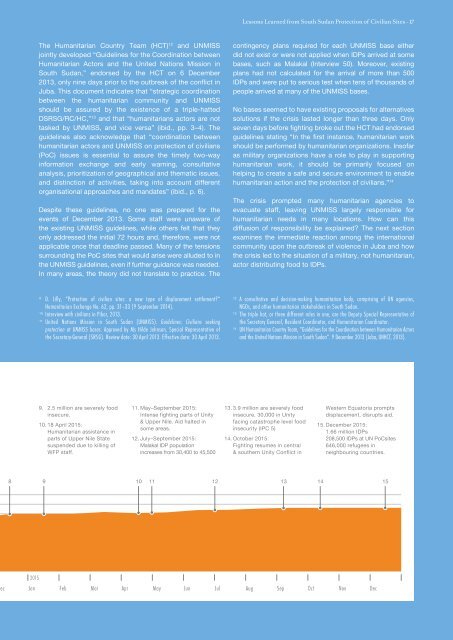Lessons Learned from South Sudan Protection of Civilian Sites 2013–2016
1rTWN7V
1rTWN7V
You also want an ePaper? Increase the reach of your titles
YUMPU automatically turns print PDFs into web optimized ePapers that Google loves.
<strong>Lessons</strong> <strong>Learned</strong> <strong>from</strong> <strong>South</strong> <strong>Sudan</strong> <strong>Protection</strong> <strong>of</strong> <strong>Civilian</strong> <strong>Sites</strong> - 17<br />
The Humanitarian Country Team (HCT) 12 and UNMISS<br />
jointly developed “Guidelines for the Coordination between<br />
Humanitarian Actors and the United Nations Mission in<br />
<strong>South</strong> <strong>Sudan</strong>,” endorsed by the HCT on 6 December<br />
2013, only nine days prior to the outbreak <strong>of</strong> the conflict in<br />
Juba. This document indicates that “strategic coordination<br />
between the humanitarian community and UNMISS<br />
should be assured by the existence <strong>of</strong> a triple-hatted<br />
DSRSG/RC/HC,” 13 and that “humanitarians actors are not<br />
tasked by UNMISS, and vice versa” (ibid., pp. 3–4). The<br />
guidelines also acknowledge that “coordination between<br />
humanitarian actors and UNMISS on protection <strong>of</strong> civilians<br />
(PoC) issues is essential to assure the timely two-way<br />
information exchange and early warning, consultative<br />
analysis, prioritization <strong>of</strong> geographical and thematic issues,<br />
and distinction <strong>of</strong> activities, taking into account different<br />
organisational approaches and mandates” (ibid., p. 6).<br />
Despite these guidelines, no one was prepared for the<br />
events <strong>of</strong> December 2013. Some staff were unaware <strong>of</strong><br />
the existing UNMISS guidelines, while others felt that they<br />
only addressed the initial 72 hours and, therefore, were not<br />
applicable once that deadline passed. Many <strong>of</strong> the tensions<br />
surrounding the PoC sites that would arise were alluded to in<br />
the UNMISS guidelines, even if further guidance was needed.<br />
In many areas, the theory did not translate to practice. The<br />
contingency plans required for each UNMISS base either<br />
did not exist or were not applied when IDPs arrived at some<br />
bases, such as Malakal (Interview 50). Moreover, existing<br />
plans had not calculated for the arrival <strong>of</strong> more than 500<br />
IDPs and were put to serious test when tens <strong>of</strong> thousands <strong>of</strong><br />
people arrived at many <strong>of</strong> the UNMISS bases.<br />
No bases seemed to have existing proposals for alternatives<br />
solutions if the crisis lasted longer than three days. Only<br />
seven days before fighting broke out the HCT had endorsed<br />
guidelines stating “In the first instance, humanitarian work<br />
should be performed by humanitarian organizations. Ins<strong>of</strong>ar<br />
as military organizations have a role to play in supporting<br />
humanitarian work, it should be primarily focused on<br />
helping to create a safe and secure environment to enable<br />
humanitarian action and the protection <strong>of</strong> civilians.” 14<br />
The crisis prompted many humanitarian agencies to<br />
evacuate staff, leaving UNMISS largely responsible for<br />
humanitarian needs in many locations. How can this<br />
diffusion <strong>of</strong> responsibility be explained? The next section<br />
examines the immediate reaction among the international<br />
community upon the outbreak <strong>of</strong> violence in Juba and how<br />
the crisis led to the situation <strong>of</strong> a military, not humanitarian,<br />
actor distributing food to IDPs.<br />
9<br />
10<br />
11<br />
D. Lilly, “<strong>Protection</strong> <strong>of</strong> civilian sites: a new type <strong>of</strong> displacement settlement?”<br />
Humanitarian Exchange No. 62, pp. 31–33 (9 September 2014).<br />
Interview with civilians in Pibor, 2013.<br />
United Nations Mission in <strong>South</strong> <strong>Sudan</strong> (UNMISS). Guidelines: <strong>Civilian</strong>s seeking<br />
protection at UNMISS bases. Approved by Ms Hilde Johnson, Special Representative <strong>of</strong><br />
the Secretary-General (SRSG). Review date: 30 April 2013. Effective date: 30 April 2013.<br />
12<br />
13<br />
14<br />
A consultative and decision-making humanitarian body, comprising <strong>of</strong> UN agencies,<br />
NGOs, and other humanitarian stakeholders in <strong>South</strong> <strong>Sudan</strong>.<br />
The triple hat, or three different roles in one, are the Deputy Special Representative <strong>of</strong><br />
the Secretary General, Resident Coordinator, and Humanitarian Coordinator.<br />
UN Humanitarian Country Team, “Guidelines for the Coordination between Humanitarian Actors<br />
and the United Nations Mission in <strong>South</strong> <strong>Sudan</strong>”. 9 December 2013 (Juba, UNHCT, 2013).<br />
9. 2.5 million are severely food<br />
insecure.<br />
10. 18 April 2015:<br />
Humanitarian assistance in<br />
parts <strong>of</strong> Upper Nile State<br />
suspended due to killing <strong>of</strong><br />
WFP staff.<br />
11. May–September 2015:<br />
Intense fighting parts <strong>of</strong> Unity<br />
& Upper Nile. Aid halted in<br />
some areas.<br />
12. July–September 2015:<br />
Malakal IDP population<br />
increases <strong>from</strong> 30,400 to 45,500<br />
13. 3.9 million are severely food<br />
insecure. 30,000 in Unity<br />
facing catastrophe level food<br />
insecurity (IPC 5)<br />
14. October 2015:<br />
Fighting resumes in central<br />
& southern Unity Conflict in<br />
Western Equatoria prompts<br />
displacement, disrupts aid.<br />
15. December 2015:<br />
1.66 million IDPs<br />
208,500 IDPs at UN PoCsites<br />
646,000 refugees in<br />
neighbouring countries.<br />
8 9 10 11 12 13 14 15<br />
2015<br />
Jan<br />
ec<br />
Feb<br />
Mar<br />
Apr<br />
May<br />
Jun<br />
Jul<br />
Aug<br />
Sep<br />
Oct<br />
Nov<br />
Dec


